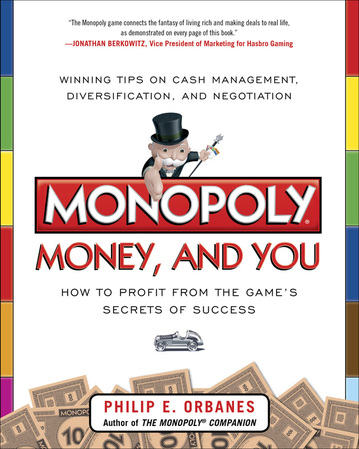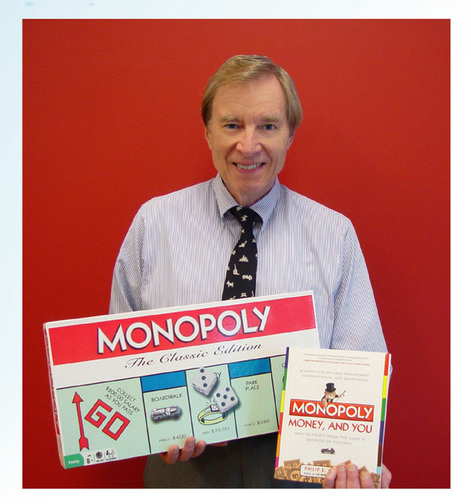Philip Orbanes definitely thinks so. A Monopoly historian, Orbanes is the owner of a specialty game company, and the author of a few books on this popular game. In his latest book, "Monopoly, Money and You: How to Profit from the Game's Secrets of Success," Orbanes offers a fascinating look at the real life lessons that can be learned from playing the game.
In this interview, Orbanes explains Monopoly's importance for kids and how to help them apply the lessons to life as well as why board games are great for family bonding.
A. Its forerunner, The Landlord's Game, was invented after the turn of the twentieth century by political activist Elizabeth Magie Phillips. Her game gestated in colleges for nearly thirty years before it was commercialized by Charles Darrow (an unemployed plumbing engineer) during the Great Depression.
Darrow gave visual charm to the otherwise featureless game. He sold limited copies in stores in and around Philadelphia, where he and his family were living. His local success caused the nation's leading game maker, Parker Brothers of Salem, Massachusetts to license Monopoly from Darrow. Parker went on to sell millions of copies. Today, Parker Brothers and Monopoly are owned by Hasbro.
Q2. What makes Monopoly such a popular game? Is there any state/country where it is the most popular?
A. Monopoly's combination of skill and luck, and reliance on negotiation skill, resembles real life. The dynamics of player interaction changes with every game, so the game relies not only everyday instinct, it is fresh every time it is played.
The U.S. accounts for about half of all units sold, but countries like Australia and the United Kingdom have a deep passion for the game, as does smaller countries where Monopoly has been introduced in recent years.
Q3. You are "the global Monopoly authority." What life lessons have you learned along the way during your tenure with Parker Brothers?
A. To "win" in life, you need to think like a game player. Establish your goals and, before making any decision, as the following question: Will it bring me closer to my goals, or will it cause me to veer off course?
Q4. Some of the key lessons you say can be learned from Monopoly include: cash management, diversification, decision-making, negotiating and dealing with adversity and luck. Can you briefly discuss each of these elements?
A. Monopoly teaches the necessity to invest in order to grow your savings. And also to wisely spread your investments (diversification) in the event once choice does not turn out as you anticipated. You must keep enough cash handy to pay for typical setbacks in the game, and in life. This varies by person and circumstance.
Monopoly also teaches the absolute need to make "good deals." This means getting along with your fellow humans, and striking deals that are slightly beneficial to you (you otherwise create ire and "negative press" if you take advantage of someone else.)
Q5. At what age should parents and kids start playing Monopoly and why? How should the game be approached?
A. Eight is a good age to start playing Monopoly. By then, kids have enough math skills to handle money and make choices. Also, they recognized they will grow to be adults, and Monopoly very much emulates the life they see adults leading.
It should be approached as a child's first meaningful experience to handle large amounts of money, with both the pleasure and pain of monetary decisions experienced first-hand (a great instructor of real life ahead.)
Q6. How can parents use your book to teach these lessons?
A. My book shows how each of the 36 secrets of success in winning Monopoly apply to real life. It also includes three vividly-illustrated example games that show these principles in action. It is possible to set up a Monopoly game board and play along to amplify the lessons.
Q7. Parker Brothers has so many other great board games, including Sorry, Clue and Risk. How important is it for families to take the time to play board games and why?
A. The primary benefits, nowadays, from playing board games is the honing of social and inter-personal skills. Board games are also a great equalizer: a child or teen can do just as well as a parent. This is a confidence booster for development in real life.
Q8. Playing chess is often cited as an extremely beneficial game for kids to play. How would you rate the benefits of playing Monopoly in comparison?
A. Chess teaches the need to plan ahead and use logical thinking. Monopoly also teaches the need to plan, but introduces the need to deal with uncertainty, which life often throws our way. One's ability to deal with the unforeseen often determines success or failure.
Q9. What's next for Monopoly?
A. Monopoly is now available in many social media, and in video game formats. Hasbro steadily finds new game play to attach to the Monopoly brand.
Q10. Is there anything else that you would like to share?
A. Monopoly is one of the world's most successful diplomats. During international tournaments, players who don't speak the same language or share the same culture, find common ground over the Monopoly board and build new friendships. The game looks the same around the world and it is therefore "trusted" no matter when and where it is played, or with whom.
To order "Monopoly, Money and You: How to Profit from the Game's Secrets of Success," be sure to click on the photos above to order from Amazon, or any other bookseller of your choosing.
CARING IS SHARING! If you've enjoyed this article, SHARE it with people in your network by clicking on the buttons below. FOLLOW me on Twitter and LinkedIn. GET on my email list for future articles. ADVERTISE on this website.



 RSS Feed
RSS Feed